Canada’s standard of living is on track for its worst decline in 40 years, according to a new study by Canada’s Fraser Institute.
The study compared the three worst periods of decline in Canada in the last 40 years – the 1989 recession, the 2008 global financial crisis, and this post-pandemic era.
They found that, unlike the previous recessions, Canada is not recovering this time. Something broke.
In fact, according to the Financial Post, since 2019 Canada’s had the worst growth out of 50 developed economies. Inflation-adjusted Canadian wages have been flat since 2016.
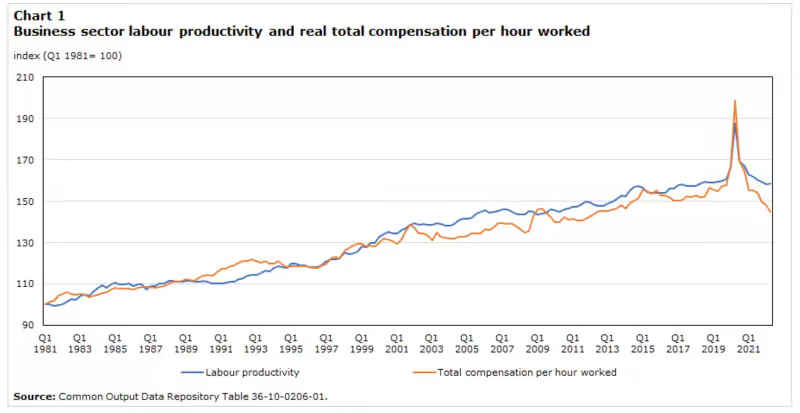
So, yes, something broke.
And it’s nowhere near over: Canada’s per-person real GDP is still falling and with a looming US recession – the US is 75% of Canada’s exports – Canada could crash again before it ever recovered.
Trudeau’s Canada in Decline
In previous videos, I’ve talked about the disaster that is Justin Trudeau’s Canada. In short, incomes are West Virginia-level, house prices are at the Los Angeles level, and Canadian taxes are halfway to the Soviet Union.
It’s not rare for a middle-class family in Canada to pay half their income in taxes.
Meanwhile, since the pandemic, Canada’s official food inflation is up 25%, and energy is up 30% – partly thanks to a carbon tax.
And keep in mind sales tax in most Canadian provinces is 13 to 15 percent on everything you buy.
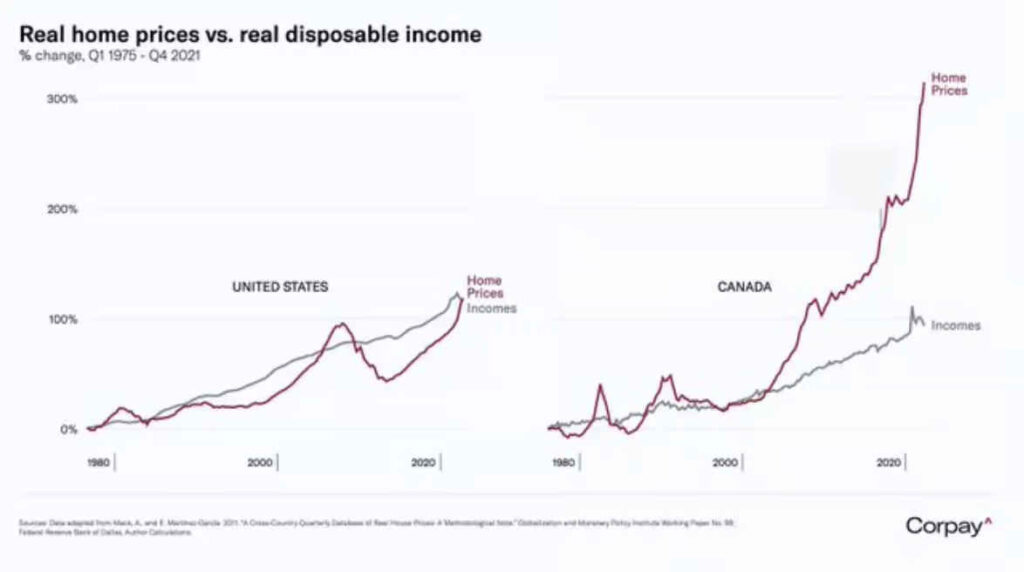
While Canadians post TikToks about trying to stretch a loaf of rye bread through the week or selling off their possessions to afford groceries, the cost of living is hitting harder with time.
Canadian bankruptcy filings jumped 40% last year, while CIBC reports nearly half of Canadians have zero emergency savings.
According to StatsCan Canada’s violent crime rate is up 40% since 2014.
An Ipsos poll found 7 in 10 Canadians agree that “Canada is broken” – rising to 8 in 10 of those between age 18 and 34.
Angus found fully 42% of Canadians are considering moving to another country.
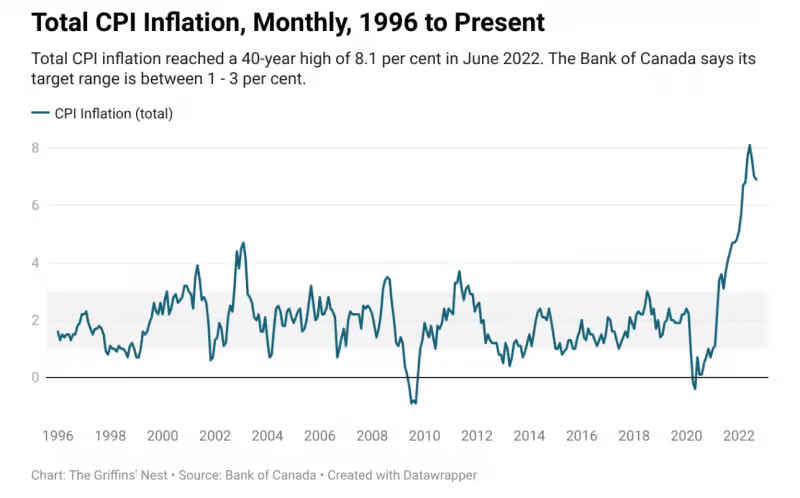
What Changed
This is all a shock because it happened so fast – it’s night and day from the last crisis in 2008, which Canada weathered much better than America.
What changed? Justin Trudeau. Specifically, his campaign to convert Canada from a mixed economy like the US into a government-dominated economy like the sick men of the European Union.
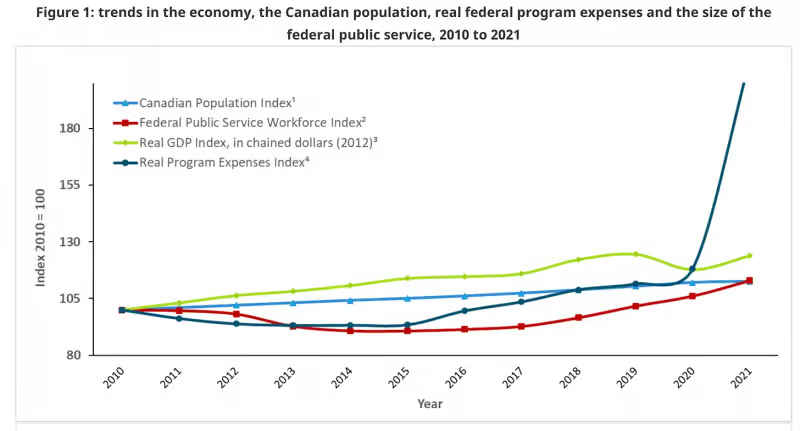
Under Trudeau, business investment has plunged by a third. While government spending nearly doubled to almost half of GDP.
Government workers in Canada are growing almost four times faster than the private sector, and one in three Canadians now work for the government, raking in 30% more in salary and benefits than the taxpayers they lord over. Another 1.7 million Canadians – roughly 1 in 10 households – are on welfare.
Of course, that makes it very difficult to win an election in Canada on a small-government platform: You’re up against the government-provided livelihoods of 40% of voters. Meaning you’ve got to win, what, 80% of everybody else.
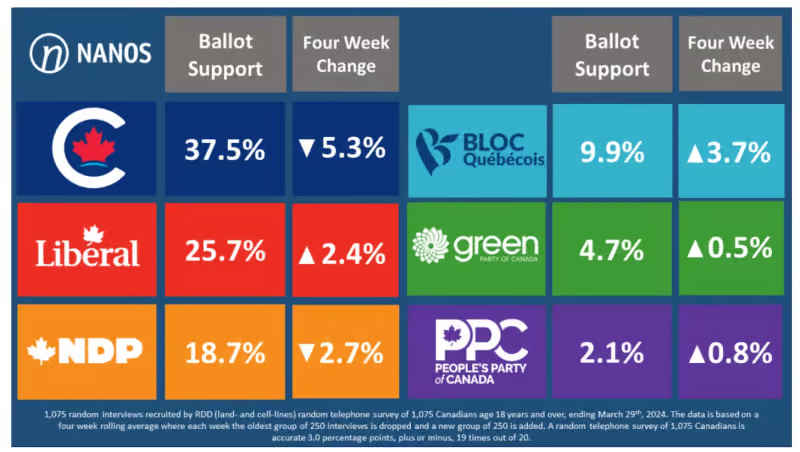
What’s Next
Near-term things will get worse because Canadians are stuck with Trudeau through the next election in 2025.
Conservative Pierre Poilievre is ahead in the polls for now, but Canada’s government-funded media is doing everything they can to destroy him so the lead’s already narrowing.
That means more inflation, more decline, more mass migration, and rising crime in what was once a paradise.
About same patern in France, once God’s own country…..
New Zealand and Australia are heading down the same path to ruin, fuelled by lazy, ill informed voters who vote in the very party’s, again and again, that ushered in the decline in the first place….
Yep. Once you get a large voting block dependent on welfare or government employment, you’ll never vote your way out.
Why actors and country music stars run the world is a mystery to me.
Great article, Peter! You’ve effectively conveyed the gravity of Canada’s economic struggles. Wondering if there’s a specific turning point that led to this? It’s alarming how things have shifted since 2008, despite previous resilience. Also, for anyone interested, there’s a site that lists global prices, world-prices.com/en/canada/prices, though not sure if it’s up-to-date. Curious to hear more on what Canada could potentially do to halt this decline. Thanks for sparking this discussion!